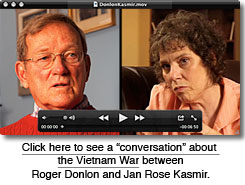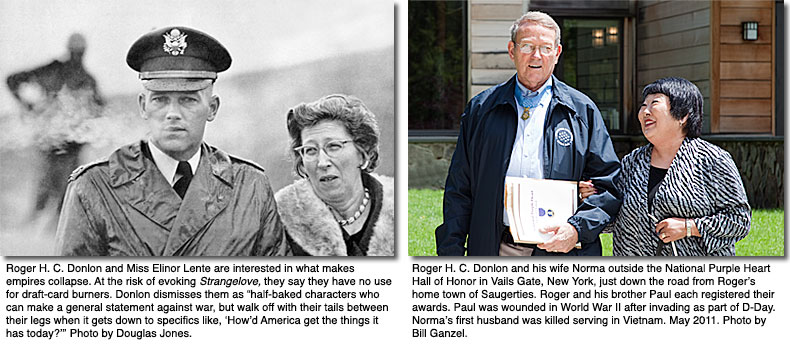|
Roger H. C. Donlon was the first Vietnam era soldier to receive the Medal of Honor for his heroic actions defending the special forces camp at Nam Dong in 1964. He was a 30-year-old captain of a team of 13 Americans and 300 Vietnamese soldiers – some of whom turned out to be North Vietnamese infiltrators in the camp. Around 2:30 a.m. on July 6, 800 North Vietnamese attacked the camp, and their allies inside started killing their neighbors. Donlon rallied his forces, redeployed weapons from damaged positions, administered first aid and fought back – all with what turned out to be seven different wounds. In the five-hour battle four of Donlon's men were killed and dozens of Vietnamese. Then, finally, a relief force reached the camp and drove the remaining North Vietnamese force back. Only then were Donlon and the other wounded evacuated by helicopter.
LOOK profiled Donlon in 1966 when he chose his Latin teacher, Miss Elinor Lente, as the most influential teacher he had in high school at Saugerties, NY. In the article, they talked about the decline and fall of nations, like the Roman Empire. Neither had anything good to say about those who were protesting against the Vietnam War by 1966. Miss Lente called them, "The lowest of the low." Donlon dismissed them as "half-baked characters who can make a general statement against the war, but walk off with their tails between their legs when it gets down to specifics like, 'How'd America get the things it has today?'"
Donlon still feels that way. "When I first came back, [the protestors] really burned my butt because I'd lost men in combat. And these people are protesting! … We're fighting for their very right to demonstrate and to voice their dissent. That's one of our freedoms. One of our basic values that we cherish in our society and culture is our freedom of speech. But there is a limit." Donlon says the protestors should have been supporting the soldiers who were protecting their rights, not calling them "baby killers."
Roger Donlon died in January, 2024, after a 12-year battle against Parkinson's disease caused by his exposure to Agent Orange in Vietnam. He was 89.
|
 |
 "Every warrior, throughout the ages, carries wounds of war," Donlon says. He admits he's been diagnosed with symptoms of Post Traumatic Stress Disorder (PTSD) – a diagnosis that was recognized by the medical profession as a result of treating veterans of the Vietnam War. "I didn't admit it [that he had PTSD] at the time, and I didn't seek any help. But I'd have to admit that I abused alcohol." Donlon says that some of his good friends kept him safe and helped him recover from the abuse. "Every warrior, throughout the ages, carries wounds of war," Donlon says. He admits he's been diagnosed with symptoms of Post Traumatic Stress Disorder (PTSD) – a diagnosis that was recognized by the medical profession as a result of treating veterans of the Vietnam War. "I didn't admit it [that he had PTSD] at the time, and I didn't seek any help. But I'd have to admit that I abused alcohol." Donlon says that some of his good friends kept him safe and helped him recover from the abuse.
Yet he has little sympathy for those who abuse illegal drugs. "There are ghosts of the 60s that are coming back," Donlon now says. "It's a ghost that has been there and hasn't gone away – drugs." Donlon says that we are living in a sober time. "We're in a global war on terrorism, we're in a time we call persistent conflict, we are the single most damaged society with the weapon of drugs [being used against us], and we're on the verge of maybe becoming discouraged. We can't allow that to happen."
In part, Donlon has found healing from his wounds by reaching out to his former adversaries. He has been back several times to Vietnam and to Nam Dong over the last few years. He talked with the commander of the North Vietnamese forces who attacked his force, and the commander admitted that there were dozens of North Vietnamese "sleepers" inside the defensive positions at Nam Dong. Donlon has reached out to the citizens of Vietnam through his participation in a foundation that is building schools and libraries in the country.
He says we all need to find the courage and faith in God that the founders of the United States had. "I believe that if you have a spiritual dimension to your life, much of your strength to continue on in your walk in life and your purpose in life [comes from] a spiritual strength you get through your faith."
|

